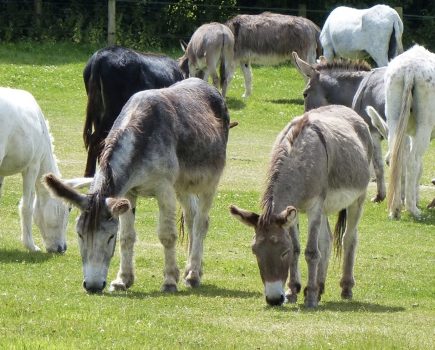January was named after the Roman god Janus. He was a two-faced deity �- literally – who was thought to be able to look forward to the coming year, at the same time as keeping an eye on the previous months. Here, on our smallholding, this attitude of mixed hindsight and foresight makes a lot of sense.
January was named after the Roman god Janus. He was a two-faced deity �- literally – who was thought to be able to look forward to the coming year, at the same time as keeping an eye on the previous months. Here, on our smallholding, this attitude of mixed hindsight and foresight makes a lot of sense. Before getting too excited about new projects, fresh resolutions, and the next growing season, we first look back at what needs renovation, where vegetable beds need rotating, and what we have learnt. I am really happy with last year’s progress here at Newhouse Farm. We started sowing and planting undercover much earlier than previous years, and the homegrown produce thrived as a result. We also bred a great collection of ducks, geese and some new chickens that have made many a delicious roast and provided us with all sizes of fresh eggs! The year ended dramatically with our old cherry tree blowing down in the winter gales, crushing our only smart wheelbarrow; many of the animal houses are also in need of some repairs and a bit of TLC. This year, before moving forward, we have several jobs to finish off and then plenty more exciting projects to get our teeth stuck into!
JOBS FOR JANUARY
• ‘A job is only easy if your tools are sharp’, or something like that! January is the perfect time to clean all your tools. Sharpening the scythes, hoes and axes is a lovely way to stay warm, and shiny blades are their own reward. We also check the machinery and give the lawnmower a quick MoT.
• Spring cleaning the polytunnel and greenhouse has become a poultry-inspired ritual for us. We allow the chickens to live in the polytunnel for a few days to eat any fallen or diseased fruit and find any sleeping pests and grubs that could cause damage later in the season. It is a great, low-effort way to clean undercover before getting stuck in with fresh compost for the raised beds and cleaning out any stored plant pots and trays.
• Willow pollarding, and then storing all of the good lengths of weaving materials, is an immensely enjoyable job, but also vital to encourage fresh, useful growth. We make our own hanging baskets out of shorter offcuts and keep the longer bits for living willow sculptures and erecting borders and fencing.
• Rotating the vegetable beds is almost as simple as moving the slate sign with the letter A to B, C to D, but it also involves us conditioning the soil ready for the coming year. We lime beds before putting in brassicas and generally top up all the beds with our homemade compost which has been breaking down over the winter. We divide our beds into different vegetable families: brassicas, alliums, legumes and umbellifers.
• Chitting potatoes nice and early is well worthwhile so that we get to enjoy some more spuds as soon as possible!
• Buying seeds is a great way to optimistically look ahead and plan the coming months. We tend to use seed catalogues as well as our local garden centre. We also rely heavily on all of our stored seeds from last year. Janus would be proud!
PIGS – THE END IS PIE
January also sees us butchering the pigs. They are now huge and have thoroughly done their job at fertilising the ground and ploughing it ready for a spring sowing.
To be honest, we have not decided yet what to grow in the area that they have turned over. I think Jerusalem artichokes may win because they grow abundantly and provide a good windbreak; then we can put the next batch of porkers straight into a food-rich field which should help save money on their feeding! If not, then maybe we’ll try something like a small patch of hemp to turn into our own string. Saying goodbye to the pigs is still a sad experience, and the farm does seem quieter without them but, over the years, the process has become part of our yearly cycle.
The pigs have a great life and live in a lovely place. When they become tasty winter meals or our own homemade sausages, we don’t say thank-you with a prayer, but we do really appreciate the whole process and enjoy the satisfaction of rearing some very good quality food.
NEW YEAR’S RESOLUTION
My New Year’s resolution as a 21st century country smallholder is to make Newhouse Farm pay for itself, instead of us paying for it. By this, I mean I want to continue to work the land and for us to be as self-sufficient as humanly possible, but I want to use all my spare time to generate income that will help not just to pay for animal feed, but also contribute to the mortgage.
This is a challenge that all smallholders face, except, perhaps, winners of the National Lottery who have chosen to spend their millions on rare breeds of chickens and expensive goats! The nature of a smallholding is not as commercial as a very large working farm or estate. For me, it is in this domestic approach to land management that smallholding involves which, to me, is its greatest appeal. We have decided that we want to be sustainable, enjoy working the land, but also preserve some aspects of living in the 21st century. Indeed, huge numbers of smallholders need to keep their day job in order to make ends meet. I am going to try and diversify Newhouse Farm into areas which preserve the lifestyle, but also generate some income. Having recently spoken to lots of other smallholders at the Country Smallholder of the Year competition, it has become apparent that there are established ways to achieve this. Making chutneys, jams and preserves is one option; breeding and selling rare breeds of livestock can work – although as a boy, aged 10, I failed miserably at this endeavour with a couple of Speckled Sussex chickens, which I had spent all my pocket money on, with the hope of rearing saleable chicks! I am intending to continue to run courses on smallholding and using our experience of sustainable technologies from Newhouse Farm. I also think that I am going to encourage my Dad to open a part-time restaurant using our produce as the ingredients?!
The bottom line is finding ways to work from home, sell things that you have grown and enjoy the lifestyle of a country smallholder whilst diversifying and making ends meet: that is going to be my challenge for 2010!







